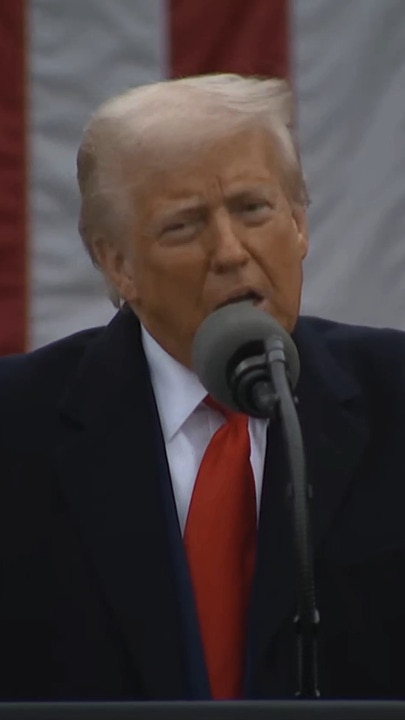America’s spectacular own goal on beef tariff
Aussies in the US will be hit with major price hikes on local produce after Trump’s tariff tax.

Aussies travelling in the US could end up paying more than $460 for a wagyu steak as a result of Donald Trump’s tariffs on agriculture exports.
Household names like McDonald’s, Burger King, supermarket Costco and some renowned American colleges source red meat from Australia, with the US importing about $6 billion worth last year.
A wagyu steak sourced from Australia costs between $US30 to $US260 in the States, depending on the quality of the cut.
If the full 10 per cent tariff is passed on, that could rise to almost US$290 at its highest – or about $460 Australian dollars.
Australian chef Neil Perry told news.com.au he expected tariffs to pump up the price of burgers in America, although it was too soon to predict any effects for local restaurants.


Mr Perry said he noticed menu prices in the US had already gone “berserk” in recent years.
“It’s almost the same prices in Australia, it was never like that at all even with the exchange rate,” he said.
David Ortega, a food economist and professor at Michigan State University, said Australia was the US’s top foreign beef supplier and the tariffs would likely raise prices in the country.
“While it’s still early to pin down the exact impact of these tariffs on specific menu items – like a McDonald’s cheeseburger or Australian steak at a restaurant—these added costs will likely be passed on to US consumers,” he said.
“That’s especially true given the strong demand for beef, coupled with the fact that the U.S. cattle herd is at the lowest level since the 1960s, leaving the market more reliant on imports to meet consumer demand.”
Mr Ortega said Australian beef was “valued here for its lean quality, which is often blended with U.S. beef in burgers and other process products”.
“That role helps sustain demand from large buyers like McDonalds, Burger King, Chipotle and Costco.”
Other huge US-based companies like warehouse chains Sam’s Club and BJs, and restaurants Cava and Sweetgreen are also facing tough decisions.
Both the University of Massachusetts and Stanford University – two of the country’s most storeyed institutions – also feed their students meat from Down Under.
Cuisine Solutions, a US company that prepares food for hotels, also uses Australian beef in its mix.
The US’s National Restaurants Association president and chief executive Michelle Korsmo released a statement saying the wide scale tariffs would “create change and disruption” for the industry.
Local industry bodies say it can adapt to the tariffs but noted the biggest losers will be consumers of Australian products in the US, such as lovers of burgers.
“Australian beef is in an estimated 6 billion hamburgers consumed each year in the US and this tariff will cost the US consumer an additional US$180m per year,” Red Meat Advisory Council chair John McKillop said.
“The total impact to the American consumer as a result of tariffs on Australian red meat will be AU$600m.”
Australian suppliers sent 394,716 tonnes of beef worth $4.16 billion to America last year alone.

McDonald’s, a known favourite of Mr Trump, revealed in 2023 it used 44,000,000kg of Australian beef in restaurants outside of Australia.
There is more than enough beef in the US for Maccas, theoretically, to avoid imports entirely.
But it’s the wrong kind of beef. US beef is generally grain fed and fattier while Australian beef is grass fed and leaner.
The US Agriculture Department mandates a fat content of patties of less than 30 per cent.
To achieve this, fast food chains will mix fattier US beef with leaner overseas beef – including from Australia – to meet the ideal fat content.
As such, it’s harder for McDonald’s to just swap entirely to US beef.
Ms Korsmo said: “Restaurant operators rely on a stable supply of fresh ingredients year-round to provide the menu items their customers want and expect.
“Many restaurant operators source as many domestic ingredients as they can, but it’s simply not possible for US farmers and ranchers to produce the volumes needed to support consumer demand.”

Garry Edwards, chair of Cattle Australia, said: “I can’t imagine that the American consumer is going to like paying more for their burgers or their steaks for the foreseeable.”
Cattle Australia chief executive Chris Parker described the tariffs as an own-goal for US consumers and cattle producers.
Cattle herd levels in the US are at 70-year lows due to drought and slaughter has also been dropping significantly.
“US beef producers can’t meet American domestic demand and Australia is the preferred supplier to fill the shortfall of high-quality grass-fed steaks,” he said.
“Our lean beef exports are also crucial – it is blended with local fatty trim to create the hamburgers that every American knows and loves.
More Coverage
“Imposing tariffs on Australian beef disregards the mutually beneficial role of each country’s supply chain, and the effects will be most acutely felt by American consumers and industry.”
A spokesman for Meat and Livestock Australia said there was mass use of imported Australian beef across America.
“The big national club stores, over 20 national retailers with stores from coast to coast, major national and international burger chains, fast casual restaurants, and even colleges and universities feeding the brains of tomorrow all source Aussie beef to supplement their beef supply’’.





